Grandpa
Jones

-
Inducted1978
-
Born
October 20, 1913
-
Died
February 19, 1998
-
Birthplace
Niagara, Kentucky
Best known for his exuberant banjo playing, novelty songs such as “Old Rattler” and “Mountain Dew,” and infectious verbal comedy on Hee Haw, Grandpa Jones was also among country music’s most dedicated champions of old-time music.
Not only did Jones help preserve clawhammer banjo playing during periods it fell into disfavor among most professional musicians, but he also kept alive the songs of country music pioneers like Jimmie Rodgers, Bradley Kincaid, Lulu Belle & Scotty, and the Delmore Brothers. In addition, Jones also helped maintain the venerable gospel quartet tradition in groups including the Brown’s Ferry Four and the Hee Haw Gospel Quartet. Though not an acoustic purist in the strict sense—he often used an electric guitar in his stage act and on his records—his devotion to “keeping it country” won him fans nationwide for seven decades as well as a longtime tenure on the Grand Ole Opry and election to the Country Music Hall of Fame in 1978.
Becoming Grandpa Jones
The youngest of ten children born to a tobacco-farming couple, Louis Marshall Jones grew up in northwestern Kentucky, just a few miles from the Ohio River. By the time he was in high school, the family had relocated to Akron, Ohio, and Jones was copying Jimmie Rodgers songs and broadcasting on local station WJW as “The Young Singer of Old Songs.”
After a stint on the popular Lum and Abner radio show (as a member of the show’s stringband), Jones and friend Joe Troyan (“Harmonica Joe”) met singer Bradley Kincaid, who was to have an immense impact on Jones’s career. In 1935, they were working with Kincaid over WBZ in Boston when Kincaid gave Jones the nickname “Grandpa” because he sounded so old and grouchy on the early morning show. Kincaid had him outfitted with a vaudeville costume, including fake mustache, and at age twenty-two, Marshall Jones became “Grandpa Jones.”
Songs
00:00 / 00:00
00:00 / 00:00
00:00 / 00:00
Recording Success
By 1937, Jones struck out on his own, playing stations in West Virginia and Cincinnati. Along the way, he met boisterous entertainer Cousin Emmy, who taught him how to play clawhammer banjo, which he soon incorporated into his act. At WLW, he joined forces with the Delmore Brothers and Merle Travis to form the Brown’s Ferry Four, one of country’s first and most popular gospel quartets.
In the fall of 1943, Jones and Travis were invited to make their first recordings, for a new, locally based label to be called King Records. Their disc, released under the pseudonym the Shepherd Brothers, was King’s first release. Throughout the rest of the 1940s, Jones recorded regularly for King, racking up hits including “It’s Raining Here This Morning,” “Eight More Miles to Louisville,” and “Mountain Dew.”
Videos
“Kitty Clyde”
The Porter Wagoner Show, 1962
“Mountain Dew”
Stars of the Grand Ole Opry, 1955
Not only did Grandpa Jones help preserve clawhammer banjo playing during periods it fell into disfavor among most professional musicians, but he also kept alive the songs of country music pioneers like Jimmie Rodgers, Bradley Kincaid, Lulu Belle & Scotty, and the Delmore Brothers.
Photos
-
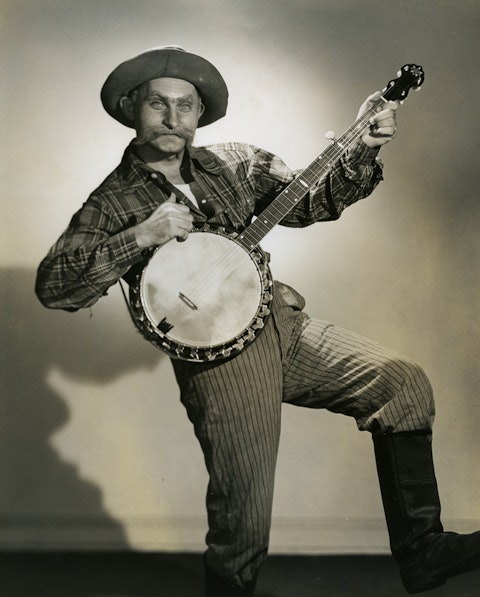
Studio portrait of Grandpa Jones holding his banjo, 1954. Photo by Walden S. Fabry Studios.
-
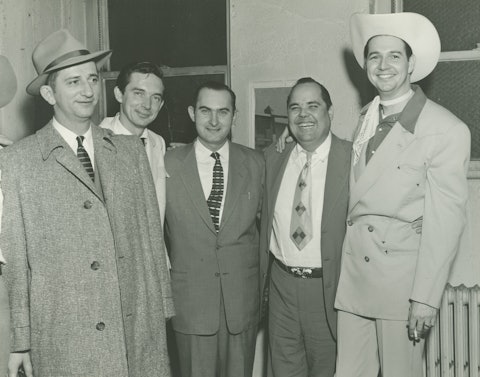
Grandpa Jones (center), flanked by (from left) Connie B. Gay, Ray Price, Chubby Wise, and Hank Thompson, 1959.
-
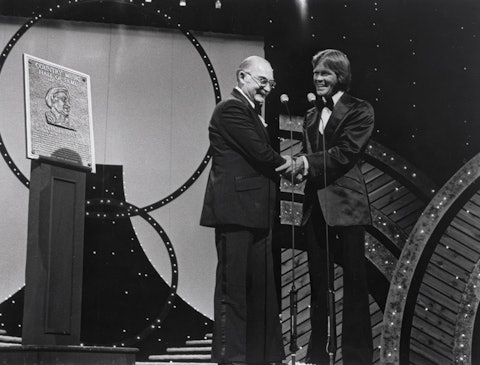
Glen Campbell (right) inducting Grandpa Jones into the Country Music Hall of Fame, 1978.
-
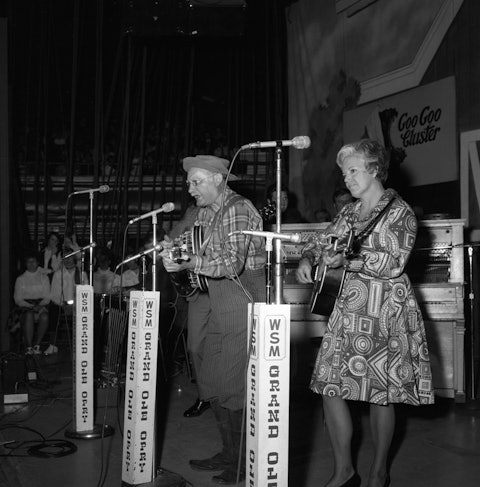
Grandpa Jones and Ramona Jones performing on the Grand Ole Opry, c. 1970s.
-
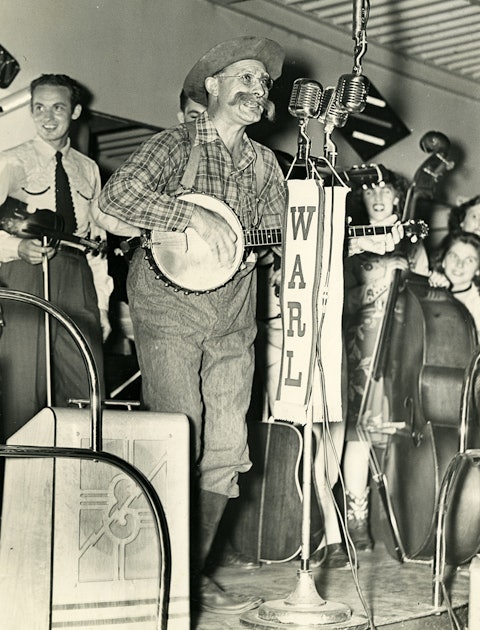
Grandpa Jones performing on radio station WARL in Providence, Rhode Island, 1948.
-
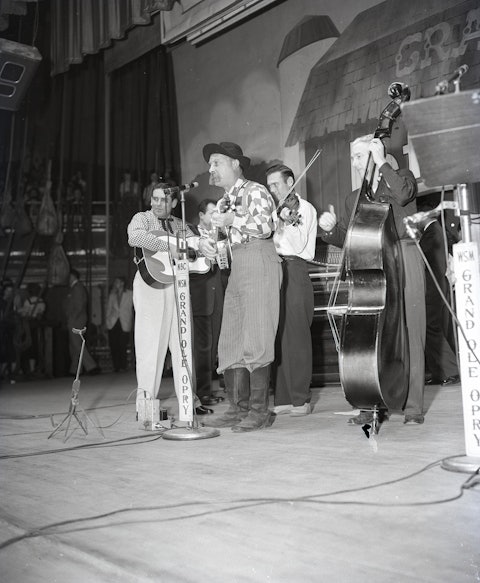
Grandpa Jones performing on the Grand Ole Opry, sometime 1955-1961. Photo by Elmer Williams.
-
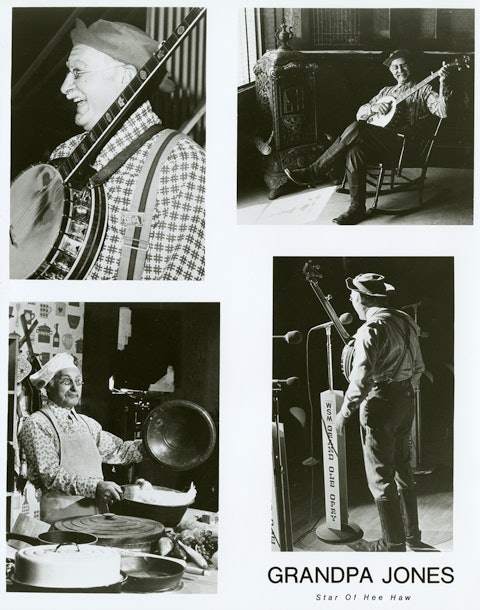
Multi-photo publicity card for Grandpa Jones, c. 1980s.
-
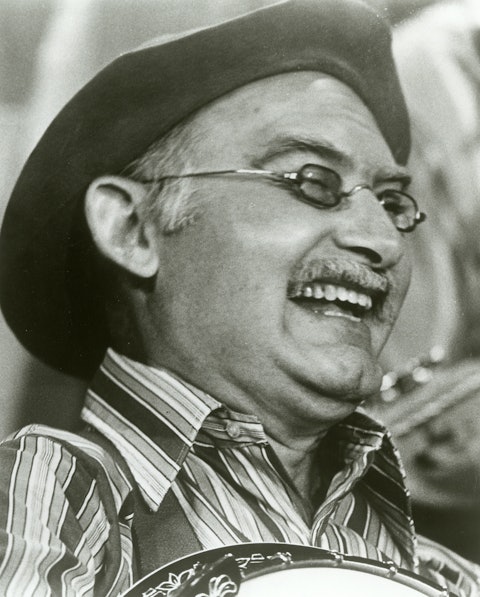
Publicity photo of Grandpa Jones, c. 1970s.
-
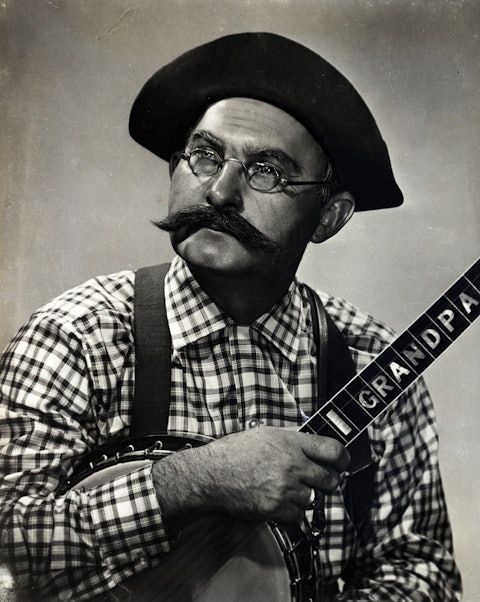
Studio portrait of Grandpa Jones holding his banjo, 1954. Photo by Walden S. Fabry Studios.
-
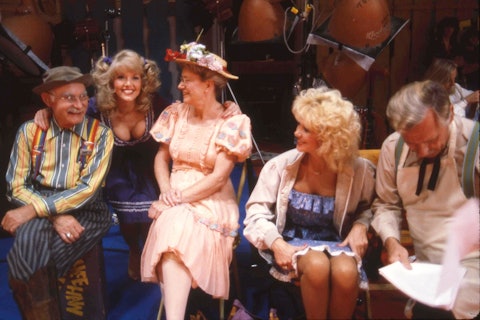
Grandpa Jones and other members of the Hee Haw cast, 1983. Photo by Raeanne Rubenstein.
Grand Ole Opry and Hee Haw Fame
In October 1946, Jones married Ramona Riggins, a talented fiddler and singer he had met at WLW, and the two moved to Nashville, where Jones joined the Grand Ole Opry. Throughout the 1950s, the pair entertained troops in Korea; made brief stays at Arlington and Richmond, Virginia, and Washington, D.C.; and recorded for RCA and Decca. By 1959, they had settled permanently on the Opry, and a few years later started a family.
In the early 1960s, Jones began recording for Fred Foster’s new label, Monument, producing a series of albums that the performer considered the best work he did. Monument also produced two of his biggest hits, a version of Jimmie Rodgers’s “Blue Yodel (T for Texas)” (1963) and the seasonal narration “The Christmas Guest” (1969).
In 1969, Jones joined the cast of Hee Haw, where he perfected his comedy with routines such as “What’s for Supper?” and worked with Minnie Pearl and his close friend David “Stringbean” Akeman, among others. In 1976, Jones and his wife started a series of albums for CMH, which included remakes of many of his early hits and gave their talented children a chance to perform with their parents.
In 1984, he published an autobiography, Everybody’s Grandpa; he celebrated his fiftieth anniversary on the Opry in 1997. Jones suffered a severe stroke just moments after an Opry performance on January 3, 1998, and died the following month.
—Charles Wolfe
Adapted from the Country Music Hall of Fame® and Museum’s Encyclopedia of Country Music, published by Oxford University Press



